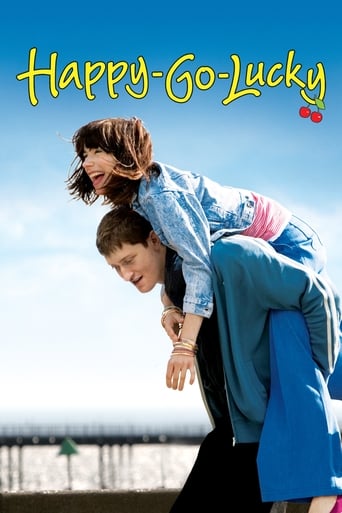keithhmessenger
Whether or not Mike Leigh made his 'upbeat' 2008 film (at least partly) in direct response to his (unfounded) reputation of 'being miserable' or whether it was simply a case (as Leigh has said) of tapping into the joie-de-vivre spirit of lead actress Sally Hawkins is perhaps a moot point, but Happy-Go-Lucky's apparent 'change of mood' went some way to splitting critics and fans alike. For me, it is not one of the man's great works, but neither is it without merit. Leigh may have strayed into 'character exaggeration' somewhat - with Hawkins' indefatigable, unattached, life-and-soul of the party and teacher, Poppy, and Eddie Marsan's conspiracy theorist and (essentially) fascist driving instructor, Scott - plus, of course, Poppy's constant stream of banter is not to everyone's comedic taste, but I don't doubt for a minute that these types of character do exist out there and Leigh (in typically perceptive fashion) gets under their skins to explore (his familiar) themes of social conditioning, family dysfunction, human miscommunication and (particularly here) what constitutes happiness in contemporary Britain. The urban milieu setting is also familiar Leigh - here middle-class, 'trendy' London - captured evocatively by regular cinematographer, Dick Pope, and scored (often jauntily) by Gary Yershon.Leigh has, of course, often had prominent female characters in his work, but Happy-Go-Lucky is notable (along with 1997's Career Girls) for being unusually female-centric. One of the film's most endearing features is the central pairing of Hawkins' 'comedienne' Poppy and her flatmate, Alexis Zegerman's 'straight man' and fellow teacher, Zoe and the scenes of the pair joshing with their student friends in their Camden Town pad are totally naturalistic and often very funny. Hawkins' performance was rightly acknowledged as outstanding (of course, the actress does 'serious' here just as well as she does 'comic'), but Zegerman is, for me, at least her equal - Zoe, in effect, being an understated foil to Poppy's OTT ebullience. Here, Leigh's drama is very much 'life as lived' i.e. episodic rather than with a strong central narrative per se, but the film's central theme of what it means to be happy is brought to life by Leigh via a series of impressive set-pieces (many characters from which can be linked back through the film-maker's past work). The uptight, controlling, but seemingly thoughtful Scott might be an updated version of Johnny from Naked or, perhaps more accurately, Keith from Nuts In May. Particularly vibrant is the flamenco dance sequence during which Karina Fernandez's instructor loses it over a past relationship, whilst Poppy's true, 'serious' (angelic?) side surfaces during the memorable night-time encounter she has with Stanley Townsend's tramp (in a scene that could have been lifted from Naked). Leigh's talent for ensemble scenes is then on prominent display during Poppy, her 'angry' sister (Kate O'Flynn's Suzy) and Zoe's visit to the domestic suburban 'haven' of Poppy's other sister, Caroline Martin's house-proud, married and pregnant, Helen. The dialogue here is particularly worthy of the film's screenplay Oscar nomination, whilst Suzy bears comparison with (among others) Jane Horrocks' Nicola from Life Is Sweet or Martin Savage's Carl from Another Year, whilst Helen could be a 'reincarnation' of either Phyllis Logan's Monica from Secrets and Lies or Marion Bailey's Barbara from Meantime.In the end, the film might be most lastingly remembered for establishing Hawkins as one of the UK's leading (and most bankable) actresses, following her earlier, less prominent roles in Vera Drake and All Or Nothing. In this respect Leigh should take a bow in terms of the nurturing of British acting talent, as Hawkins thus follows in the footsteps of Lesley Manville, Jim Broadbent, Timothy Spall, Phil Davis, Ruth Sheen, Brenda Blethyn, Imelda Staunton, Daniel Mays, Peter Wight, Marion Bailey, Dorothy Atkinson and many others - a list potentially even stretching to include Phil Daniels, Tim Roth and Gary Oldman from 1983's Meantime!
Hafu Reykjavik
The tempo in the opening scenes is so happy and positive that it pegs you down thinking that something exciting is going to come of this. The acting is lively and engaging while the costume and set designers have made sure to draw up colours that make you almost as happy as Poppy. And as to something coming of this - yes, there is a well sculpted climax that I would not have wanted to miss. However, there is a fundamental flaw to the movie and the plot that left a bad taste in my mouth. It is reckless on behalf of the director. The main Protagonist, Poppy, is a primary school teacher and one of her pupils is having trouble which is expressed on a number of occasions through him bullying other students. A social worker is brought in and they make a break through as they interview the kid. However, that part of the plot is left there - with the teacher and the social worker saying it is going to be OK - and they actually start sleeping together. However, the break through is not pursued and never solved, leaving perhaps the most urgent of all the issues the movie raises untreated, a little like a discarded drink carton.Hence, my problem with the movie - an interesting social observation that pretends to want to make you happy but completely ignores the most important issue it raises.






